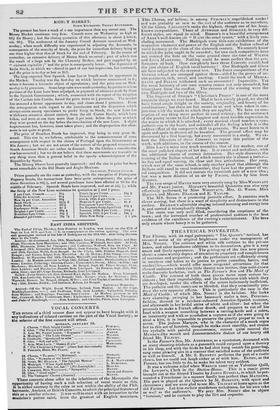VOCAL CONCERTS.
"Tna return of a third season does not appear to have brought with it any indications of relaxed exertion on the part of the Vocal Society; as the scheme of the first concert will attest.
MONDAY, JANUARY 19.
1. Chorus, " Hail, bright Cecilia" PCRCIT.T.. 2. Glee, The Ilarp's wild notes " ATT WOOD. 3. Aria, Mr. PARRY junior, " II wader " (Onto) HAYDN.
4. Madrigal. "The Lady ()rhino" WILNYE.
5. Graduate, "Quodirtual in orbs" Bottum..
G. Glee, " Soft and safe " CAI.I.COTT.
7. Aria, Miss LACY, " Stanea di pin" M•RLIANI.
8. " The Christian's Prayer" (three first movements) Siva a. O. Fantasia, Horn, Mr. PLATT. ACT II.
10. Chorus, "To arms!" (M./hawed) STORACE.
11. Glee. "Nymphsof the forest" IS Scena, Mr. Baarram. " The Spanish Matron" Ifortst.r.r.
G. A. NIAcrAnnrir, 13. Madrigal, " W When April deck'd " L. MARENELO, 14. Quintetto, " 11m. hm, hm ! " (lie ZrwLerfL.Ue) MOZA rr.
15. Canzonet, Miss Woonyarr. " Sympathy " Havon.
16. Glee. " Good night" ARSE And Birder. 17. The Vintagers' Chorus (Seasons) HAYDN.
These concerts alone offer to the inhabitants of the Metropolis the opportunity of having such a rich selection of vocal music as this. It is either contrary to the rules or not within the ability of the Phil- harmonic, Ancient, or British Concerts, to admit the principal features of this or a similar scheme. It was well to start with an invocation to the musician's patron saint, from the greatest of English musicians. This Chorus, we believe, is among Pvitetu.'s unpublished works ; and was probably as new to the lest of the audience as to ourselves.
Of the Glees, CAta.corr's tanks the highest, though one of his least-
known compositions. Those of Arrwoon and HORSLEY, in very dif- ferent styles, are equal in Mind. Bunioe's is a beautiful arrangement
of A itsie's well-known sir " If o'er the cruel tyrant," with a lively con- cluding movement. The Madrigals were first-rate exhibitions of the respective character and power of the English and the Italian school of
vocal harmony at the close of the sixteenth century. We scarcely know to which the palm ought to be awarded ; for two such competitors have not entered the lists on the same ground since the time of IVILUSR and LUCA MARENZJO. Nothing could be more perfect than the per- formance of both. How completely have these Concerts established the just claims of English vocal harmony ! Our Madrigals and Glees are here subjected to the severest test. The finest compositions of the German school are arranged against them—aided by the graces of ac- companiment, rich, novel, and exciting. Could the trash of MERCA- DANTE and Bets.Nt withstand such an encounter? Impossible. Yet the vocal harmony of our own country comes not only unscathed, but triumphant from the conflict. The encores of the evening were the two Madrigals and two of the Glees. The fragment of Smile's " Christian's Prayer" is one of the most exquisite things we ever heard. Had it been merely played, we should have found ample delight in the variety, originality, and beauty of its combinations; but these are but means to an end when taken in con- junction with the words to which they are applied. We have no con- ception of any thing more perfect in vocal writing; for the sentitneet of time poetry seems to find its happiest and most forcible expression its the music to which it is attached ; every musical chord touches a sym- pathetic one in the heart, and enkindles all the feeling which it is the noblest effort of the composer's skill to generate. We must listen to it again and again to discern all its beauties. The general effect may be discovered by a first hearing, but every movement is a study. We ex- hort the Directors of these Concerts to repeat this portion of the work, with additions, in the course of the season.
Miss LACY'S voice very much resembles that of her mother, one of the most polished singers of her day. It is sweet and melodious, with the additional charm of correct intonation. Her style discovers the training of the Italian school, of which country she is almost a natis e— its fine and equal voicing, its dear and free articulation. Her song, which was of the same school, is only another proof that although the Italians still excel in vocal instruction, they have lost the power of vo- cal composition. It did not contain the twentieth part of a new idea ; but was a mere dilution of an air by PACINI, stolen by him front Rossisi.
The two songs of HAYDN were very sweetly sting by MissWoonvArr and Mr. PARRY junior. MOZART'S beautiful Quintetto was also very effectively performed, by Miss WoonYArr, Mrs. G. Woon, Miss HAINES, and Messrs. BRAHAM and E. TAYLOR.
The MS. SCella is a promising juvenile effort. It contains much clever scoring, but there is a scant of siniplicity and distinctness in the outline. BRAHANI'S admirable singiag infused meaning and energy into it, and carried it triumphantly through.
The room was very well filled, considering the emptiness of the town ; and the increased number of professional auditors is the best evidence of the excellence of the evening's entertainment. The bees only swarm where honey is to be gathered.


























 Previous page
Previous page